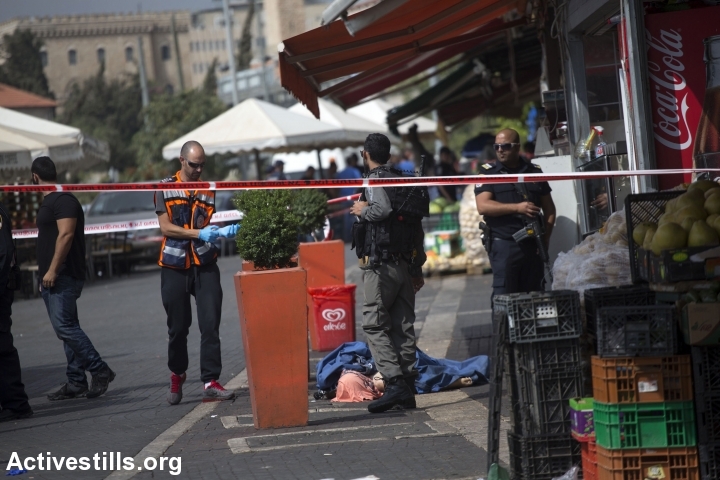From one fatal police shooting to the next, the Israeli legal system is becoming less and less relevant, and is losing its ability to fulfill its role.
Yesterday I published John Brown’s latest article on my Facebook wall. The article includes a video that clearly shows Fadi Alloun, the young Palestinian man from Issawiya, being shot and killed by police officers despite not posing a threat when shot. There is no question here of not knowing “what happened before” — even if Alloun did stab someone, the police could have subdued him and protected the passersby without killing him. Alloun, put simply, was executed to the cheers of the onlookers who encouraged the officers to shoot.
My Facebook feed is certainly not characterized by right-wing hawkishness of any kind, and yet I was astounded by the number of responses justifying the shooting without any qualms. “Anyone who stabs innocent civilians is a terrorist, the police did the right thing,” wrote more than one person.
Video: Fadi Alloun shot by police while not posing a threat
But the fact is that Israeli law does not (yet) have a death sentence for terrorists. In fact, it was Netanyahu himself who buried that very bill. And justifiably so, in his view; legislation requires a principled discussion — even for the sake of outward appearance — by the legislative body vis-a-vis the values that it seeks to enshrine in its law books. A move that would be exposed to both local and international criticism.
Israel’s legal system is supposed to reflect its collective principles, as formulated by its elected officials. It holds a substantial statement. And when that statement reflects those who say it in a bad light, it is always easier to implement the policy itself without taking responsibility for its moral significance. That way, Sharon Gal (who proposed the “death to terrorists” law) gets what he wants — death sentence for “terrorists,” defined in the widest possible way — while the Israeli legal system remains clean of any law that may tarnish it in the eyes of many Israelis, not to mention the international community.
The legislative authority is not the only one to become redundant in light of a practice that turns every police officer on duty into the judge, jury, and executioner. The license to kill granted to every person in uniform with a weapon makes the legislative authority, and its role in establishing public norms, redundant as well. Judicial trial is important for two reasons: protecting the rights of the accused — even for the most heinous crimes — to give his/her side of the story. The second is the judicial practice itself, which uses previous rulings to formulate ethical norms. And while the legal system’s priority is the law (rather than justice), the court has a critical role in interpreting the laws in accordance with the principles it seeks to reflect.

Thus, for instance, the fact that Igal Amir was not executed immediately after assassinating Yitzhak Rabin, but rather was caught and brought before a court, allowed him not only to plead his case, it also allowed Israeli society at large to see how it acts in these kinds of extreme cases. It allowed us to inquire as to how we understand assassinations — as opposed to other crimes — and how we reflect this understanding through our verdicts. These discussions, permitted and driven by judicial practice, are essential to the formation of a set of norms and values that create the foundations of the civic sphere. For this we need a strong, independent, and mostly viable judiciary.
The fact that time after time, these decisions are made far away from the court room by policemen and other armed individuals, leads to a dangerous atrophying of one of the three branches that allow functioning checks and balances in a democratic society. From one fatal shooting to the next, the Israeli legal system is becoming less and less relevant, and is losing its ability to fulfill its role. Worse even is the fact that instead of rising up against this trend, the judiciary is gladly giving up its responsibility.
If the State of Israel wants to sentence to death every stabber, stone or Molotov cocktail thrower, or anyone who yells “Allahu Akbar,” it should do so properly: it should assemble its legislature, bring the proposal for a vote, and decide. If it is decided that the fate of every stabber is death, the courts will have to authorize the law and sign off on verdicts that came about as a result. It might not look as good for the Supreme Court justices when they rub shoulders with their international counterparts at their next cocktail party, but this is the least we, the viewers and participants in this Western, deserve. The least we deserve is to know the rules.
This piece was first published in Hebrew on Local Call. Read it here.


